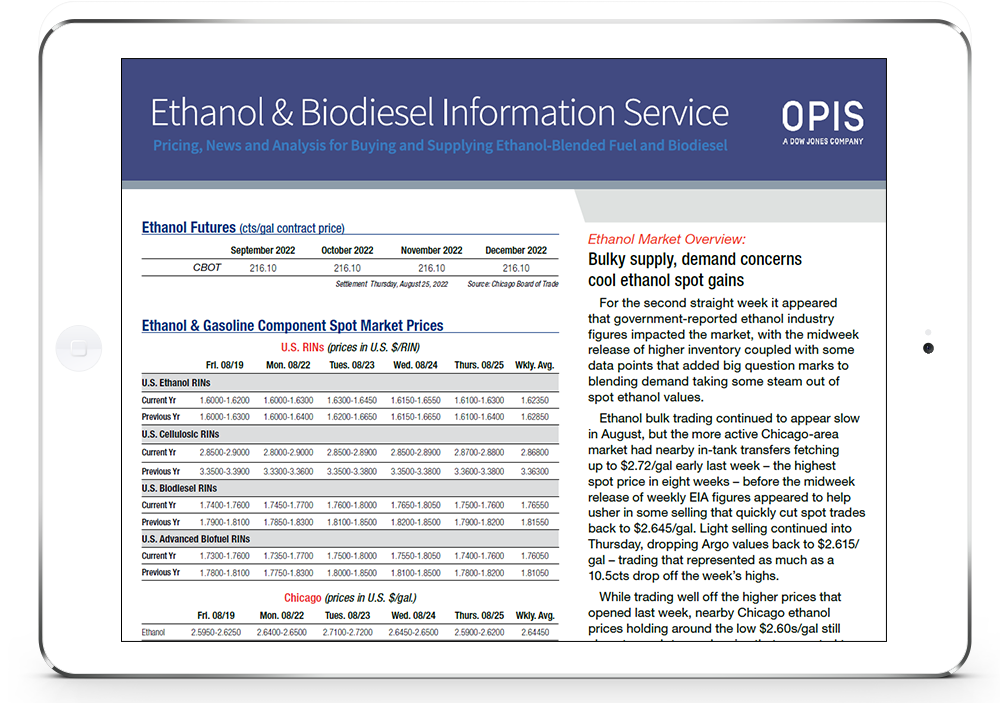Carbon capture and sequestration technology has been heralded by some as a savior for the US ethanol industry, but CapCO2 Solutions CEO Jeff Bonar insists that he has a better one.
Bonar's company has collaborated with Adkins Energy to take steps to build the first facility to convert ethanol plant waste CO2 to green methanol.
"The Adkins board has approved the project. We're just about done with the engineering study," said Bonar.
The plan is to produce green methanol on-site at Adkins' ethanol plant in Lena, Illinois. The output is expected to eventually reach 84,000 metric tons per year.
There seems to be little doubt in Bonar's mind that the project will reach fruition.
"I'm very confident. Eighteen months ago, it wasn't clear that there was an economic case for green methanol. Now, there's a huge economic case for it. The production and demand for green methanol fuel is through the roof."
Methanol is used in thousands of everyday products, according to Bonar, including insulation, gutters, roofing, paints, carpets, tires, plastics, fertilizers, cosmetics and even Lego bricks.
Methanol can also replace diesel fuel, he said, adding: "The traditional method of manufacturing methanol is fossil-fuel intensive, but ethanol can be made 'green' by using captured biogenic C02 emissions and renewable energy."
 When green methanol is burned, it adds no new CO2 to the atmosphere, according to Bonar, making it a net-zero fuel.
When green methanol is burned, it adds no new CO2 to the atmosphere, according to Bonar, making it a net-zero fuel.
"Methanol burns with no waste products, and even if spilled causes no environmental damage," he said.
In addition to replacing carbon-intensive traditional methanol in consumer products, Bonar says it "can easily be used as a transportation fuel because conventional diesel engines can be inexpensively modified to run on green methanol."
As evidence of green methanol's popularity, Bonar offers the shipping industry, which he claimed "is pretty much standardized on green methanol," citing its usage by Maersk and Amazon.
"There are now more than 200 ships commissioned to use green methanol. Even Disney Cruises has commissioned a green methanol ship. So there's just no worry about green methanol being an important fuel."
Technology Licensed From EU-based Company
CapCO2 says its technology, licensed from EU-based Real Carbon Tech, is efficient and easily deployed. CapCO2 has exclusive rights to sell it in the US.
The technology was developed by a researcher at a university in the Netherlands. It was commercialized by Real Carbon Tech, an engineering firm in Poland, and is already deployed at a cement plant there.
"The technology is basically proven. So what could go wrong? Now we just have to get it working in an ethanol plant, and I think the floodgates open."
The company is concentrating on ethanol facilities because the output is greater, according to Bonar.
In addition, ethanol plant locations are "far simpler than the existing cement plant location," he said, "so we don't have any big engineering problems."
The process is environmentally friendly, Bonar has said, because it captures carbon before it is released into the atmosphere, adding: "Also exciting are byproducts that can be sold as commodities rather than transported by pipeline and buried as waste."
Furthermore, Bonar notes that the lower carbon index of green methanol makes it eligible for premium prices in low-carbon fuel markets.
There are other people pursuing green methodology, Bonar noted, "but they don't have the technology."
"Real Carbon Tech has three families of patents in 60 countries," he said, "so I'm not worried about an immediate competitor for exactly their technology."
A small pilot unit being built now is expected to be done by the middle of next year. That would be followed by 12 to 24 months to build a full-scale facility. Both are to be deployed at the Adkins plant.
"One of the advantages of our technology is that it's modular," Bonar said. "The pilot is one shipping crate. The full scale is eight shipping crates, all on the same patch of ground next to the plant."
Financing Not Expected to be a Problem
"There are lots of people who want to loan money for a capital project that they know is going to produce revenue over 15, 20 or 25 years," Bonar said. "We just have to have one plant proven working to do that."
The US Dept. of Energy has a program in which "essentially they guarantee the loan for large infrastructure," according to Bonar, who added: "They've said, 'Your stuff sounds great. Get one running, and we're very interested in guaranteeing financing for the full-scale project.'"
Bonar indicated that he can envision a scenario in which his company teams up with the carbon capture and sequestration projects planned in the Midwest.
"I could see the proposed pipelines ending up licensing our technology, concentrating some biogenic CO2 into a region and then having a methanol plant there," he said.
Biogenic CO2 is the key ingredient for a diverse and valuable family of net-zero chemicals and fuels, according to CapCO2.
"If I were them, I'd be working on that hard because the burying of CO2, I don't think, is a good business," Bonar added. "Yeah, the government will pay you to do it for a few years, but is that really the model?"
CapCO2's plan is to have 20 to 40 installations completed five years from now.
"We may set up a factory in either Illinois or Iowa or somewhere like that and build these shipping crates and crank them out," Bonar said. "That would be a way to scale it up much more quickly than one at a time.
"We've got our hands full to do that for the next two years. We are busy. Right after that, who knows?"
In the meantime, Bonar will presumably keep extolling the virtues of his endeavor.
"Investing in pipelines rather than green methanol," he says, "is the equivalent of investing in slide rule technology when the future is computing."
--Editing by Jordan Godwin, jgodwin@opisnet.com


